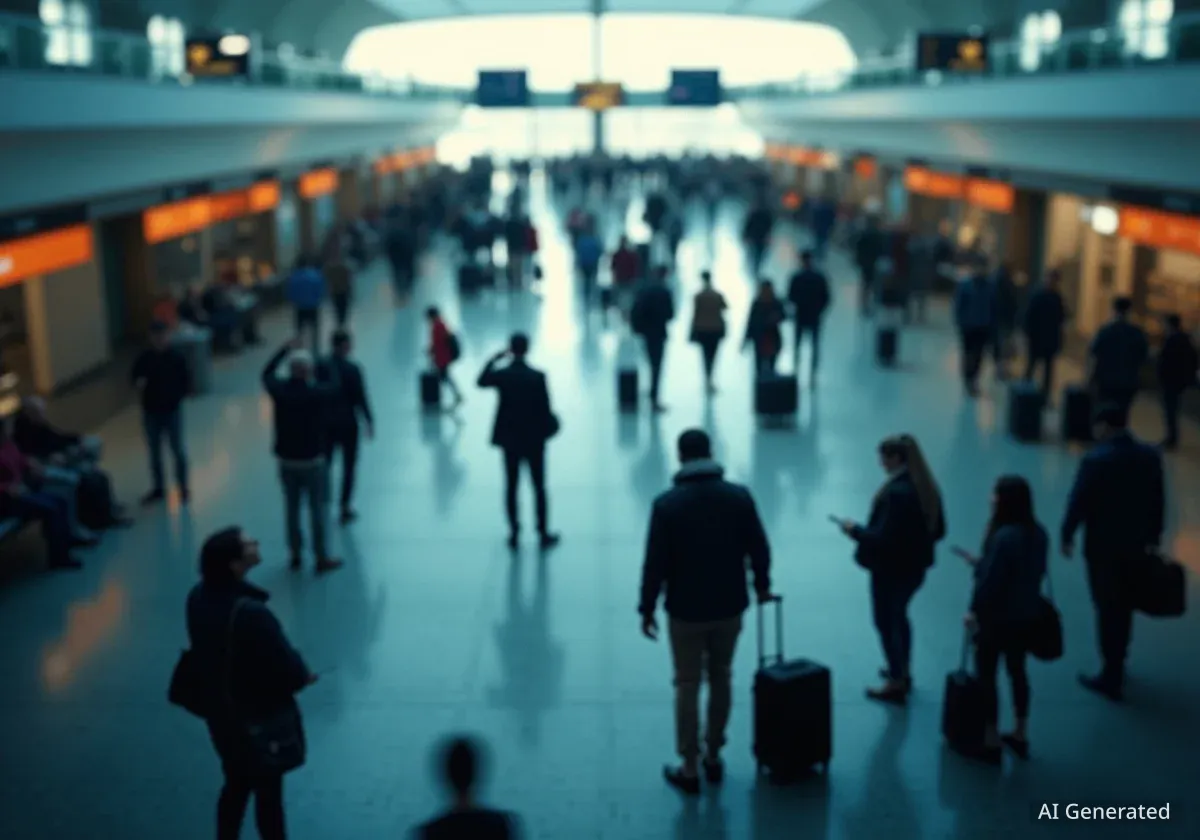United Airlines flights across the United States experienced a nationwide grounding on Wednesday morning due to a significant "connectivity issue." The Federal Aviation Administration (FAA) issued a ground stop at the airline's request, impacting travel operations for approximately 30 minutes before the order was lifted. This temporary halt caused widespread delays and some cancellations, particularly affecting major airports in Texas.
Key Takeaways
- United Airlines flights were grounded nationwide on Wednesday morning.
- The cause was a "connectivity issue" within United's systems.
- The FAA issued a ground stop at United's request.
- Operations resumed after about 30 minutes.
- Hundreds of flights were delayed, with Texas airports heavily affected.
Nationwide Ground Stop Details
The incident began early Wednesday, prompting a swift response from both United Airlines and federal aviation authorities. The FAA confirmed that it issued a ground stop for all United flights in the U.S. This action was taken between 12 a.m. and 1:30 a.m. CT. The decision to ground flights was made to ensure safety and to allow United to address the technical problem.
A ground stop means that aircraft are not permitted to depart from airports. This measure helps prevent further complications in the air traffic control system when an airline experiences operational difficulties. For passengers, it often leads to significant delays, even if the stop is brief.
Quick Facts
- Duration: Approximately 30 minutes.
- Reason: "Connectivity issue" within United Airlines' systems.
- Authority: Federal Aviation Administration (FAA) issued the ground stop at United's request.
Impact on Flight Operations
Despite the relatively short duration of the ground stop, the ripple effects were felt across United's network. Many flights were delayed, and some were canceled. Air travel systems are complex, and even a brief disruption can take hours to fully resolve as aircraft and crews must be repositioned.
According to data from FlightAware.com, the impact was substantial. As of Wednesday afternoon, there were 614 delays and 36 cancellations for United Airlines flights across the nation. These numbers highlight the broad reach of the technical issue.
"The temporary grounding was a necessary step to ensure operational integrity while our teams addressed the technical issue," a United Airlines spokesperson stated. "We apologize to our customers for the inconvenience and are working to minimize further disruptions."
Texas Airports Face Significant Delays
Airports in Texas experienced some of the most notable disruptions. Dallas-Fort Worth International Airport (DFW) and George Bush Intercontinental Airport (IAH) in Houston reported a high number of delayed United flights. These hubs are critical for travel within the state and across the country.
Background on Ground Stops
Ground stops are relatively rare but can occur for various reasons, including severe weather, air traffic control system failures, or airline-specific operational issues. They are a safety measure designed to prevent aircraft from taking off when conditions or systems are not optimal. The FAA coordinates closely with airlines during such events to ensure a safe and orderly resumption of flights.
- DFW Airport: Recorded 126 delays and 8 cancellations for United flights.
- IAH Airport: Reported 53 delays with no cancellations for United flights.
These figures show that while cancellations were fewer, the sheer volume of delays significantly impacted passenger travel plans in these major Texas cities. Passengers at these airports faced longer wait times and revised travel schedules.
Recovery and Future Outlook
United Airlines began working to restore its normal flight schedule immediately after the ground stop was lifted. However, the effects of such an event can last for several hours, or even a full day, as airlines try to get back on track. Passengers are advised to check their flight status regularly through the United Airlines website or app.
Technical issues like the one experienced by United Airlines underscore the reliance of modern air travel on complex digital systems. Airlines invest heavily in redundant systems and cybersecurity to prevent such incidents, but occasional disruptions can still occur. The quick resolution of the ground stop, within 30 minutes, indicates that United's teams were able to identify and address the core connectivity problem relatively fast.
For affected travelers, understanding their rights and options is important. Airlines typically offer rebooking options or refunds for significantly delayed or canceled flights due to operational issues. Passengers should contact United Airlines directly for specific assistance regarding their travel plans.
Minimizing Passenger Impact
Airlines often have protocols in place to assist passengers during unforeseen disruptions. This includes providing updates, offering meal vouchers for extended delays, and arranging hotel stays if an overnight stop becomes necessary. The goal is to minimize the inconvenience for travelers.
The incident serves as a reminder for all travelers to stay informed about their flight status, especially during periods of potential disruption. Subscribing to airline alerts and checking airport websites can provide timely information.
The aviation industry continuously works to enhance system reliability. This incident, while disruptive, highlights the operational challenges airlines face in maintaining seamless service across a vast network.





